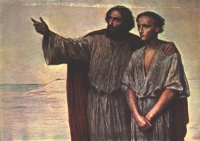User:SysopJ/My sandbox: Difference between revisions
Jump to navigation
Jump to search
No edit summary |
No edit summary |
||
| Line 1: | Line 1: | ||
<td width=50% bgcolor="whitesmoke"> | |||
<div style=" font-size:130%; border:1px solid #ccc; background:#d8dfe8; margin:0; padding:.3em; color:#000;">Featured Article</div> | |||
[[File:Disciple_and_Master.jpg|right|200px|thumb|Master and disciple]] | |||
'''[[Chela]]''' is the word used in Hinduism to describe the religious student or disciple of a spiritual master or guru. In [[Theosophy]] the term is frequently used to refer to a person that has become a disciple of one of the Masters of Wisdom, being thus a candidate for initiation into the [[Esoteric Philosophy]]. Generally, speaking, there are three degrees of chelaship – a lay chela, a probationary chela, and an accepted chela. Some synonyms frequently found in the Theosophical literature are "Disciple" and "Lanoo." Chelaship is a frequent topic of the [[The_Mahatma_Letters_to_A._P._Sinnett_(book)|Mahatma Letters]]. | |||
</table> | |||
| | |||
< | |||
Revision as of 16:35, 28 June 2022
Featured Article
Chela is the word used in Hinduism to describe the religious student or disciple of a spiritual master or guru. In Theosophy the term is frequently used to refer to a person that has become a disciple of one of the Masters of Wisdom, being thus a candidate for initiation into the Esoteric Philosophy. Generally, speaking, there are three degrees of chelaship – a lay chela, a probationary chela, and an accepted chela. Some synonyms frequently found in the Theosophical literature are "Disciple" and "Lanoo." Chelaship is a frequent topic of the Mahatma Letters.
